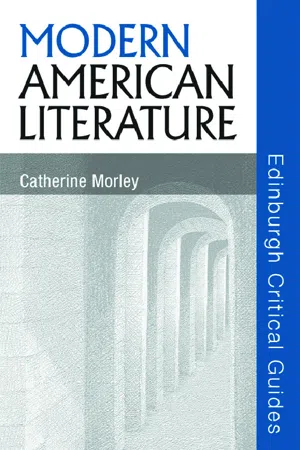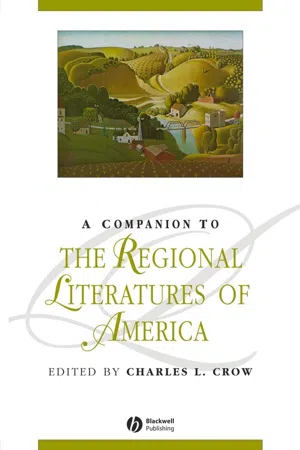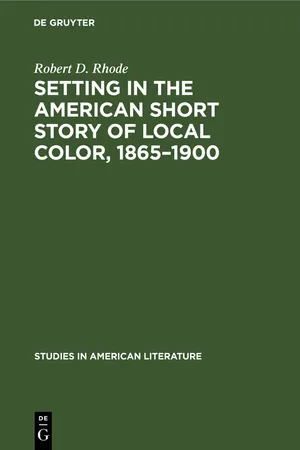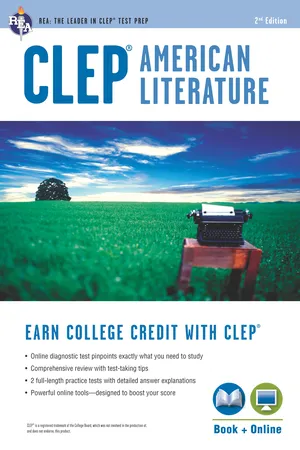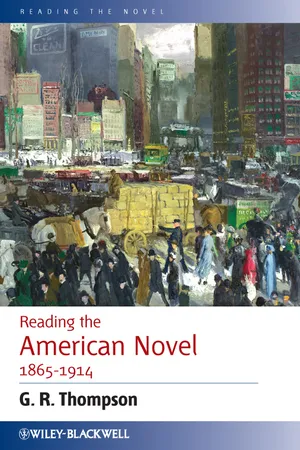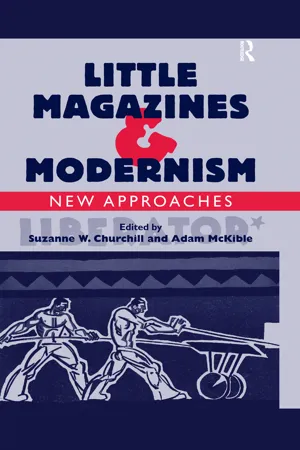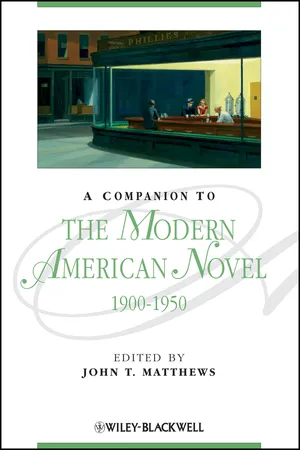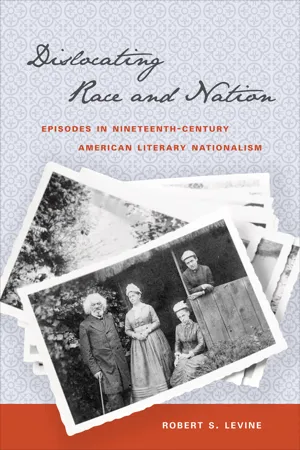Literature
American Regionalism Literature
American Regionalism Literature refers to a literary movement in the late 19th and early 20th centuries that focused on depicting the unique characteristics and culture of specific regions in the United States. Writers such as Mark Twain and Sarah Orne Jewett captured the dialects, customs, and landscapes of their respective regions, often critiquing the impact of industrialization and modernization on rural life.
Written by Perlego with AI-assistance
Related key terms
1 of 5
9 Key excerpts on "American Regionalism Literature"
- eBook - PDF
- Catherine Morley(Author)
- 2012(Publication Date)
- Edinburgh University Press(Publisher)
chapter 3 Regional American Modernism O n the face of it, the combination of modernism and regional-ism can seem a contradiction in terms. After all, modernism is synonymous with the international avant-garde, stylistic experi-mentalism and formal innovation, whereas regionalism brings with it connotations of nostalgia, parochialism and literary realism. For a long time, literary regionalism was tied up with the term ‘writing of local color’, a somewhat dismissive expression which allowed critics such as F. O. Matthiessen to relegate writers like Sarah Orne Jewett to the ranks of the second division, where she languished as a supposedly minor American writer. Whatever one’s thoughts on Jewett (and recent critics have done much to rescue her from the literary scrapheap and revive her reputation), the negative conno-tations of sentimentality, folk wisdom, localism and resistance to wider national forces continue to be associated with much regional writing. 1 In some cases, of course, these associations were not unfair. Much nineteenth-century regional writing was indeed saturated with a mawkish nostalgia for lost innocence, lovingly describ-ing the recent past with a documentary realism that bordered on the obsessive. Thomas Nelson Page and Joel Chandler Harris offer clear examples of this kind of fiction, with their emphasis on the domestic rituals of the homestead and the kinship bonds of regional communities. As early as 1937, the critic James Gray wryly remarked of regional writing: regional american modernism 105 The militantly American doctrine called regionalism, which has tended in recent years to make a local prejudice some-thing vaguely resembling a religion, would probably hold that the heavenly Muse does herself over, with protean variability, each time she crosses a state line . . . The costume assigned to the Minnesota Muse, in the regionalist’s handbook, is a decent, though shabby, Mother Hubbard. - Charles L. Crow(Author)
- 2008(Publication Date)
- Wiley-Blackwell(Publisher)
It helps to tell the story of literature’s relationship to culture because it indexes the constantly changing interaction between literary forms and a broader discussion over what con-stitutes “America” in an American literary tradition. Despite the nostalgia that seems to motivate critical work on regional writing (a nostalgia that mimics the tone of much of its object), regional writing has never disappeared. It has retained a toehold in the American canon throughout the nineteenth and twentieth centuries, and has, for some critics, become the source of the most productive contemporary rumina-tions on imperialism, cosmopolitanism, nationalism, and the spread of a potentially homogenizing global economy. Though it is these very elements that are often charged with threatening the local culture that regionalism represents, regional writ-ing rarely dismisses or ignores them; on the contrary, it is a genre constituted by the desire to address, confront, critique, and even transform them. Like the places and people it portrays, regional writing has proven itself to be remarkably enduring and flexible because it is capable of accommodating and transforming the very elements that seemed to most threaten it. Regional writing helped to imagine a nation that was composed of discrete and complex subcultures. In doing so, it worked to represent all forms of social difference as dynamic cultural variations that could be assimilated into an idea of Americanness and that, according to its logic, already traversed the idea of the nation. Regional writing is therefore one of the first genres that tried to understand the nation itself as an ideologically inflected cultural construct, and that tried to supplement the official story of what counted as American by providing “unofficial” histories of the nation’s inhabitants.- Robert D. Rhode(Author)
- 2019(Publication Date)
- De Gruyter Mouton(Publisher)
He may work from two independent sources and still be able to achieve a single emo-tional effect. Regardless of the truth concerning the source of feelings for nature, they must be recognized as something more than literary conventions or habits. James Lane Allen's stories, for example, show a passion for trees and birds reminiscent of animism, hylo-zoism, and other ancient mystic cults. Though such elements clash with the Darwinian tone he sometimes assumes, they illustrate the wide range which the local colorists used in their search for novel uses of setting. Regionalism, Local Tradition, and Atmosphere Regionalism, a term often applied to local color literature, should be 42 The Art and Business of Story Writing (New York, 1912). 28 INTRODUCTION distinguished from sectionalism, which refers usually to an aggressive, political, or patriotic interest in some part of the country and is propagandistic in tone. Regionalism, which is now applied mainly to a new movement of the present century, provides a legitimate subject matter for literature. 43 Donald Davidson has defined regional literature in part as a self-conscious expression of the life of a region, which may exploit intimate and local aspects of its scene, thus recovering the 'usable past' so much referred to. 4 4 If regionalism is to be defined, however, as Allen Tate defines it, as only the immediate, organic sense of life in which a fine artist works, 45 it may hardly be distinguished from its nineteenth cen-tury prototype. Both movements produced literature pertaining to particular regions. The contemporary movement is generally recognized as an offspring of the local color movement, differing from its parents by greater depth and a superior sense of tradition.- eBook - ePub
Regionalism and Nationalism in the United States
The Attack on "Leviathan"
- Donald Davidson(Author)
- 2017(Publication Date)
- Routledge(Publisher)
The Saturday Review upon regionalism, Allen Tate defined regionalism as “the immediate, organic sense of life in which a fine artist works,” and distinguished this regionalism which is the voice of genuine tradition, from the regionalism which is merely documentary, antiquarian, or picturesque. “A selfconscious regionalism,” he said, “destroys tradition with its perpetual discovery of it; makes it clumsy and sterile.”Somewhat later, in an essay, “Don’ts for Literary Regionalists,” in The American Review, Robert Penn Warren attacked the “get-rich-quick psychology” of the regionalists who treat regionalism as simply another literary invention, a facet of our general eclecticism. Warren listed six errors into which such regionalists might fall:(1) Regionalism is not quaintness and local color and folklore, for those things when separated from a functional idea are merely a titillation of the reader’s sentimentality or snobbishness…. (2) Regionalism based on the literary exploitation of a race or society that has no cultural continuity with our own tends to be false and precious. It is a touristic regionalism….(3) Regionalism does not necessarily imply an emphasis on the primitive or underprivileged character…. There is a literature of false primitivism as well as the literature of superficial sophistication; and most of this literature has claimed the label of regionalism….(4) Regionalism does not mean that a writer should relinquish any resource of speculation or expression that he has managed to achieve…. A writer’s worst dishonesty would be to deny, on the ground of theory, part of his own temper and own resource; to limit, arbitrarily, the sensibility he would bring to his material….(5) Regionalism does not mean that literature is tied to its region for appreciation…. [It] does not imply in any way a relaxing of critical standards….(6) Even literary regionalism is more than a literary matter, and is not even primarily a literary matter…. The danger in regionalism lies in its last syllable, in the ism - eBook - ePub
- Jacob Stratman(Author)
- 2016(Publication Date)
- Research & Education Association(Publisher)
Literary naturalism is said to be a product of scientific determinism. Here’s a simple definition: You are controlled by your environment. There is no hope for you. Dreams come and dreams go. You are controlled by your gender, race, socioeconomic standing, and ethnicity. There is a glass ceiling and you will hit it every time you venture beyond your status. Depressing, huh? Yes, it is. There is more to the literary movement than that, of course. Naturalism was greatly influenced by the work of Charles Darwin, Isaac Newton, Karl Marx, and Emile Zola, and other naturalists who posited that humans are not that different from animals in that they merely respond to natural and environmental forces without fully understanding the forces or their reactions to them. What is also important about naturalist fiction is that the author and the narrator are amoral in their depictions of the characters and the plot: they do not judge or editorialize; they merely observe.RegionalismThe end of the nineteenth century and the beginning of the twentieth century saw an increase in authors and works published outside of New England. It’s not an understatement to assert that Boston was the cultural and intellectual center of America during the eighteenth and nineteenth centuries. However, westward expansion, the Civil War, the railroad, and a growing Union gave space for literature to be produced in the Middle West, the West, and the South. “Regionalism” is a literary term that refers to a work that connects itself to a particular geography: its history, culture, ways of speech, leisure activities, occupations, folklore, food, clothing, and so on. In fact, the setting of the story takes on the role of another character; the plot cannot take place just anywhere without suffering greatly. In this section, we will pay attention to regionalists such as Mark Twain, Kate Chopin, Willa Cather, and Jack London.THE MAJOR WRITERSMark Twain (Samuel Langhorne Clemens; 1835–1910)Twain is still one of the most recognizable names in American literature. Elementary students still read The Adventures of Tom Sawyer (1876), and many high school students are familiar with the highly comic story “The Notorious Jumping Frog of Calaveras County.” Clemens chose the penname “Mark Twain,” a steamboat term meaning “safe water,” that both referred to his years as a steamboat pilot on the Mississippi River and to his years as a journalist and political humorist where pseudonyms were popular and necessary. Twain’s writing has been praised and ridiculed for its strong denouncement of social ills. He constantly attacks and skewers American values that seem to contradict human decency and integrity: slavery and economics were two of his favorite topics. Twain wrote many articles and short tales for magazines and newspapers before he published Innocence Abroad , a satirical account of his traveling in Europe and the Holy Land, in 1869. Continuing his love for travel writing and satire, in 1872 Twain published Roughing It - eBook - ePub
- G. R. Thompson(Author)
- 2011(Publication Date)
- Wiley-Blackwell(Publisher)
Regionalism sounds straightforward enough but turns out to be a surprisingly erratic term. Typically, regionalism implies not an urban but a rural location; and the word strongly connotes a writer who focuses on his or her native region. But a writer may live in more than one place and become attuned to the spirit of more than one place.Among such writers are Henry James, Edith Wharton, Frank Norris, W. D. Howells, Hamlin Garland, and Kate Chopin. New Hampshire-born Constance Fenimore Woolson's works of the 1880s included several story collections and novels about the South, where she lived for a time. The best known are East Angels (1886), in which a Northerner comes to the rescue of the belle of a failing Florida plantation, and Jupiter Lights (1889) in which sisters-in-law represent conflicting Northern and Southern cultures. The popular writer of stories with a “surprise ending,” O. Henry (William Sydney Porter), born in North Carolina, wrote stories set in Honduras (Cabbages and Kings , 1904), Texas and Tennessee, and New York (The Four Million , 1906, the collection for which he is most famous). Massachusetts-born Horatio Alger (1834–1899) starts his “Pluck and Luck” rags-to-riches novels with a bootblack in New York City in Ragged Dick (1867). New York-born Bret Harte moved to San Francisco about the age of seventeen and is best remembered today as the author of Western, mainly California, stories, including the novella M'Liss (rev. 1873) and the stories in The Luck of Roaring Camp and Other Sketches (1870), which included the celebrated “The Outcasts of Poker Flat.”Perhaps the preeminent example of regional syncretism is Mark Twain. Sam Clemens grew up in Missouri, along the banks of the Mississippi River, the setting of his most famous works, Tom Sawyer (1876) and Huckleberry Finn (1884–5), of his antiracist novella Pudd'nhead Wilson (1894), and of his semi-disenchanted autobiographical reminiscence Life on the Mississippi (1885). But he went west as a young man, to Nevada and California, and even to Hawaii; his first literary success was with the Sierra Nevada stories of The Celebrated Frog of Calaveras County and Other Sketches - eBook - ePub
Little Magazines & Modernism
New Approaches
- Adam McKible, Suzanne W. Churchill(Authors)
- 2016(Publication Date)
- Routledge(Publisher)
Columbia History of the American Novel, edited by Emory Elliott et al. (New York: Columbia University Press, 1991).28 Stephanie Foote, Regional Fictions: Culture and Identity in Nineteenth-Century American Literature (Madison: University of Wisconsin Press, 2001), 3.29 Ibid., 6.30 Ibid., 15.31 Cf. Josephine Donovan, New England Local Color Literature: A Women 's Tradition (New York: Frederick Ungar, 1983); Judith Fetterley and Marjorie Pryse, "Introduction," American Women Regionalists, 1850-1910: A Norton Anthology (New York: Norton, 1992); Kate McCullough, Regions of Identity: The Construction of America in Women's Fiction, 1885-1914 (Palo Alto, CA: Stanford University Press, 1999).32 "Regionalism—notes," Frederick Papers.33 The Midland 1 (1915), 243.34 For a discussion of this use of the term cosmopolitan, see Lutz, Cosmopolitan Vistas ; James Clifford, Routes: Travel and Translation in the Late Twentieth Century (Cambridge, MA: Harvard University Press, 1997); Pheng Cheah and Bruce Robbins, eds, Cosmopolitics : Thinking and Feeling beyond the Nation (Minneapolis: Minnesota University Press, 1998).35 Mary Austin, "Regionalism in American Fiction," English Journal 25 (February 1932), 97-107.36 "Introduction," in Out of the Midwest, - John T. Matthews(Author)
- 2013(Publication Date)
- Wiley-Blackwell(Publisher)
Insofar as it gives voice to peripheral locations and incorporates ethnographic techniques, regionalist literature has often been associated with ethnic writing. Philip Fisher, for example, writes of a new twentieth-century regionalism, where “local color was not that of climates and regions, but of hyphenated Americans: Jewish-Americans, Italian-Americans, Irish-Americans, WASPs, Chinese-Americans, Polish-Americans, Swedish-Americans, and Russian-Americans. This was a regionalism of languages, folk customs, humor, music, and beliefs set against the pull of what came to be called Americanization” (Fisher 1999: 174). An understanding of regionalism in terms of cultural hybridity leads Fetterley and Pryse to categorize Sui Sin Far as a writer who applied regionalist techniques to a number of different US Chinatowns, despite her cosmopolitan background and predominantly urban settings (2003: 280–314). Tom Lutz has recently argued that regionalist writing played a crucial role in the development of an inclusive and implicitly color-blind ethos of “literary cosmopolitanism” in American literature (2004: 4). Whereas these attempts to link the regional with the ethnic emphasize the “literary” aspect of the phrase “literary regionalism,” this section will focus on the material dynamics of regional production and the differential allocations of labor, mobility, and rights that it requires. Regions and races are not distinct phenomena to be compared with one another; rather, regions have played key roles in the expropriation, abjection, and exploitation of racialized subjects. Nor does ethnic regionalism simply instill readers’ identification and sympathy with individual nonwhite characters: it also explores historical processes of racialization in locations ranging from Indian reservations to the Jim Crow South and the Rio Grande Valley, and it often imagines collective rather than interpersonal solutions to the inequalities that it documents.- eBook - ePub
Dislocating Race and Nation
Episodes in Nineteenth-Century American Literary Nationalism
- Robert S. Levine(Author)
- 2009(Publication Date)
- The University of North Carolina Press(Publisher)
In chapters 1 and 2, I will provide a fuller picture of developments in American literary nationalism, but suffice it to say here that much of what U.S. writers produced over the first several decades of the existence of the new nation struck many observers as imitative of the British tradition. As I will discuss in chapter 3, during the 1840s and 1850s, with the emergence of the writers we now associate with an “American Renaissance,” a more confident note was struck by the American literary nationalists associated with New York’s Young America literary circle. The story of American literary nationalism thus generally follows a triumphant arc in which we move from the allegedly imitative writings of Freneau and Dwight to the supposedly more authentic “American” writings of Emerson and Whitman (and Hawthorne, Melville, and others) who generally have been regarded, at least since the publication of F. O. Matthiessen’s American Renaissance (1941), as having fulfilled the goals of the first generation of U.S. literary nationalists. This story of national literary development and fulfillment has a measure of explanatory power, but as critics over the past several decades have noted, it is limited for a number of reasons. In a very basic way, the historical premises of such a story are invariably anachronistic, the result of the needs, interpretive models, and desires of a relatively small number of literary nationalists being imposed retrospectively and all too neatly on literary debates that were much messier at the time than subsequent literary critics have generally allowed. The story of the emergence of a distinctively American literature also assumes that nonimitative is best (and even possible), when the reality is that most American literary nationalists of the early period saw imitation as a form of literary talent, even genius
Index pages curate the most relevant extracts from our library of academic textbooks. They’ve been created using an in-house natural language model (NLM), each adding context and meaning to key research topics.
